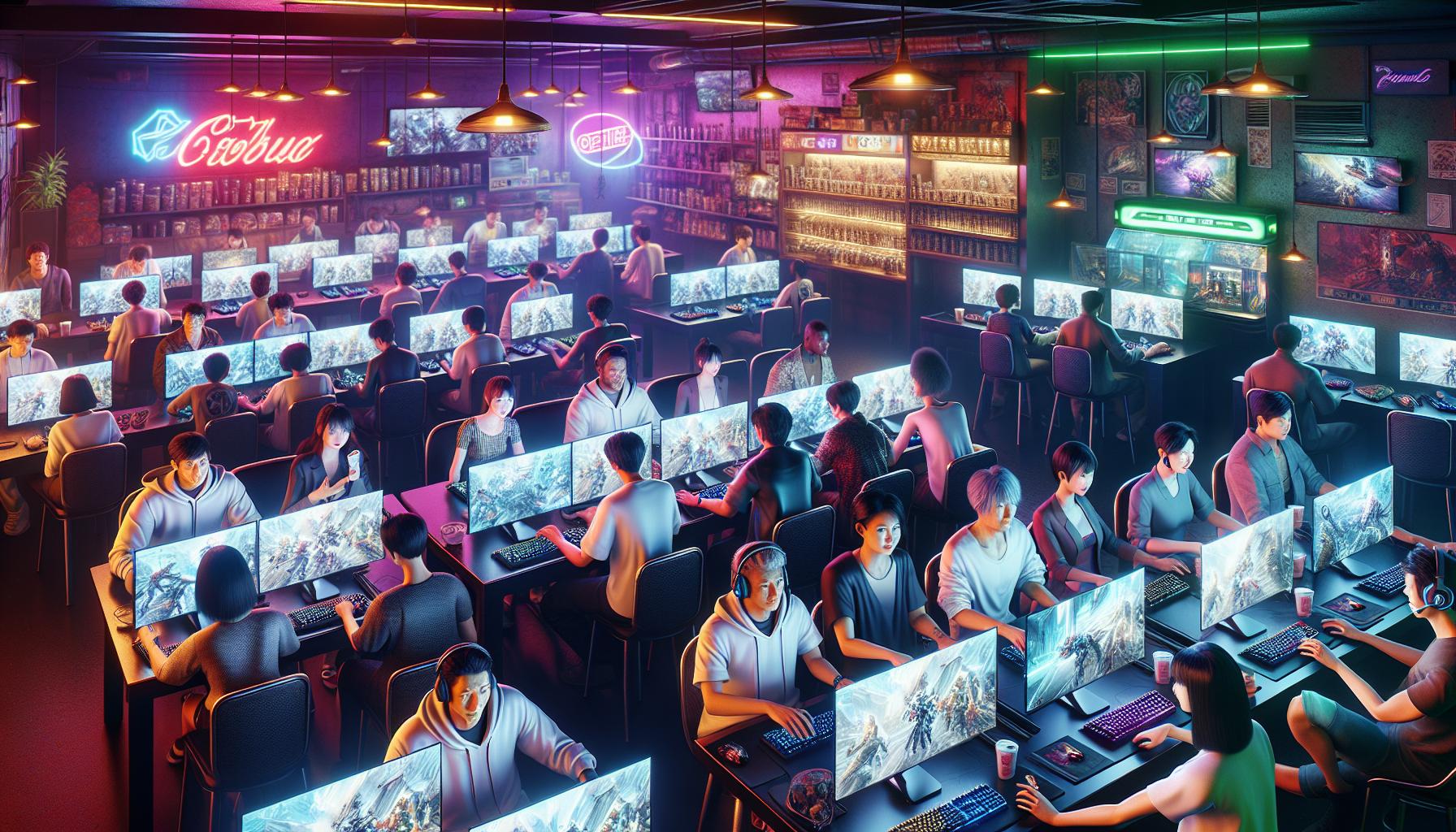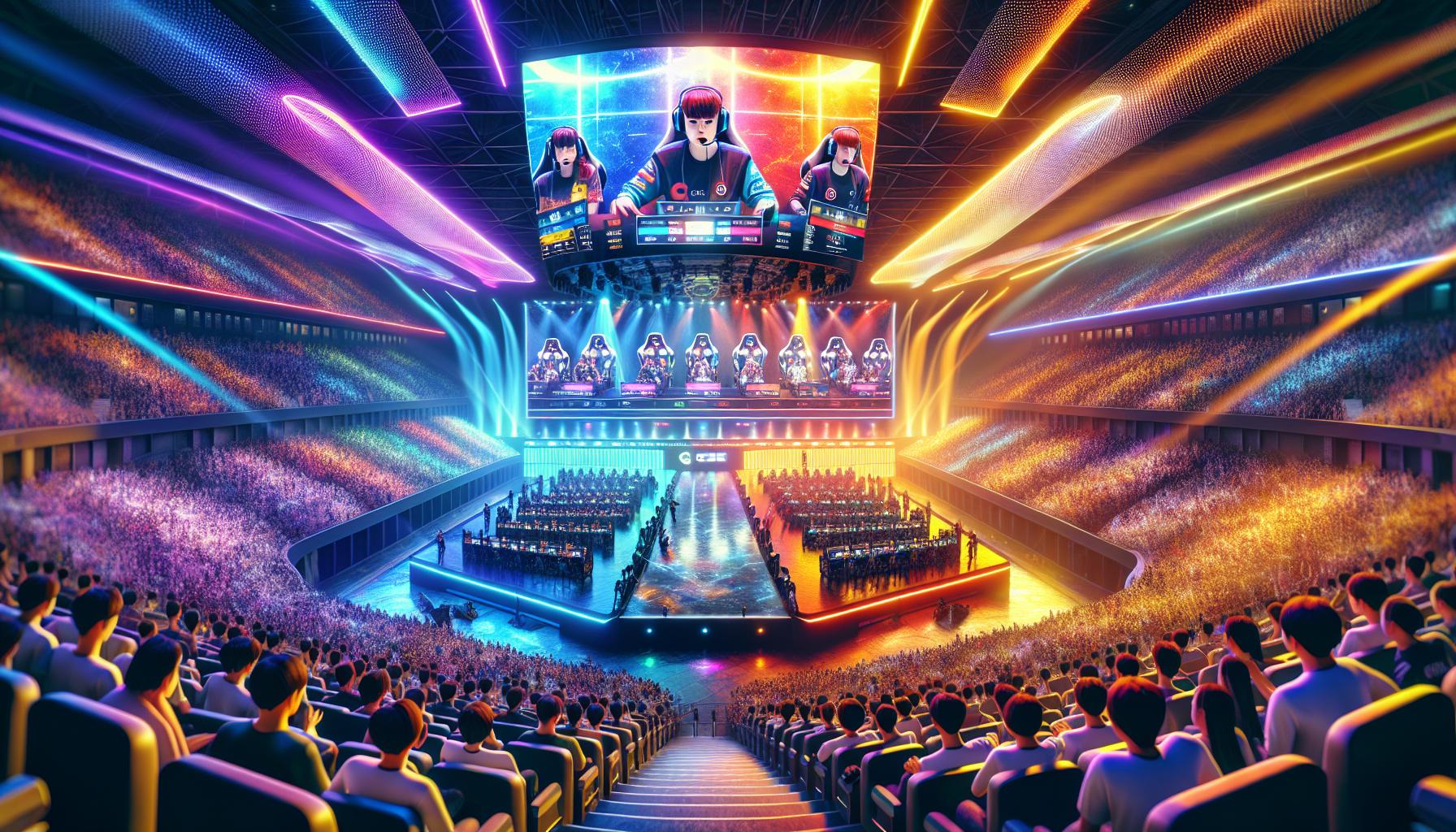Key Takeaways
- Origins of Esports: South Korea’s esports scene began in the late 1990s with the rise of internet cafés, fostering a competitive gaming community that flourished around titles like StarCraft.
- KeSPA Formation: The establishment of the Korean e-Sports Association (KeSPA) in 2000 formalized the esports landscape, organizing tournaments and regulations, and helping elevate esports to a legitimate sport.
- Cultural Impact of Key Titles: Games such as StarCraft and League of Legends not only dominated the competitive scene but also became cultural phenomena, creating celebrity players and widespread fan engagement.
- Professional Growth: The rise of professional teams and structured tournaments turned gaming into a viable career, setting examples for aspiring esports athletes and shaping industry standards.
- Government Support: South Korean government initiatives played a crucial role in recognizing esports as a legitimate sport, offering financial support and educational programs to solidify its place in society.
- Global Influence: Korea’s contributions to the esports arena have set a global benchmark, with international tournaments hosted in the country and Korean players renowned worldwide for their exceptional skills.
In the vibrant landscape of competitive gaming, South Korea stands as a pioneering force in the world of esports. From the early days of arcade gaming to the explosive rise of professional leagues, the country’s journey is a testament to its passion and innovation. The evolution of esports in Korea has not only shaped the gaming culture but also set the stage for global trends that continue to influence the industry today.
As gaming transitioned from a casual pastime to a highly organized sport, South Korea embraced this change with open arms. The establishment of dedicated esports arenas and the popularity of games like StarCraft and League of Legends transformed players into national heroes. This article delves into the rich history of esports in Korea, exploring key milestones that have defined its unique identity and global impact.
History Of Esports In Korea
Esports in South Korea began in the late 1990s, coinciding with the rise of internet cafes. Gamers gathered in these cafes to play popular titles, fostering a community around competitive gaming. Competitive play gained momentum with the launch of StarCraft in 1998, which became a cultural phenomenon.
In 2000, the establishment of the Korean e-Sports Association (KeSPA) marked a significant step toward formalizing the esports scene. KeSPA organized tournaments, created regulations, and promoted esports to a wider audience. By 2002, StarCraft: Brood War leagues attracted millions of viewers, televised and streamed across the nation.
The introduction of League of Legends in 2009 expanded esports’ reach further. Major tournaments like the League of Legends Champions Korea (LCK) drew in extensive fanbases and sponsorships. Esports became a staple of South Korean entertainment, with professional players achieving celebrity status.
Government support played a pivotal role in esports’ growth. Initiatives to recognize esports as a legitimate sport occurred, enabling infrastructure development and educational programs. Universities began offering esports-related degrees, legitimizing professional gaming as a career path.
Overall, South Korea’s dedication to esports transformed the landscape, creating a model for other countries to emulate. The blend of community, competition, and recognition laid the foundation for a vibrant esports culture. The legacy of this development continues to influence global trends within the industry.
Early Beginnings

Esports in South Korea began its journey during the late 1990s, establishing a cultural foundation that would lead to its global prominence. Several key developments contributed to this evolution.
The Emergence of Competitive Gaming
Competitive gaming gained traction with the introduction of StarCraft in 1998. This real-time strategy game captivated players, fostering a sense of rivalry and collaboration. The formation of the Korean e-Sports Association (KeSPA) in 2000 marked a turning point, as it organized tournaments and regulated competitions. By 2002, StarCraft: Brood War leagues garnered millions of viewers, solidifying esports as a legitimate sport in South Korea. The surge of competitive play set the stage for future titles, like League of Legends, which further enriched the esports landscape.
The Role of Internet Cafés
Internet cafés played a pivotal role in the growth of esports within South Korea. These establishments provided an accessible space for gamers to convene, hone their skills, and engage in friendly competition. The proliferation of high-speed internet enabled seamless multiplayer experiences, encouraging social interaction and a vibrant gaming culture. Internet cafés fostered a community atmosphere, helping to create a generation of dedicated gamers who laid the groundwork for the professional esports scene.
The Rise of Professionalism

Professionalism in South Korean esports emerged rapidly, evolving from grassroots competitions to structured organizations and formal events. This transformation set a global standard for esports professionalism.
Formation of Professional Teams
Professional teams began to form in the early 2000s, driven by the success of popular games like StarCraft: Brood War. Teams such as SK Telecom T1 and KT Rolster established themselves, attracting top talent and sponsorships. These organizations offered players salaries, training facilities, and support systems, turning gaming into a viable career. By 2013, the launch of League of Legends led to the creation of more teams, emphasizing player development and strategic play.
Early Tournaments and Competitions
Early tournaments played a crucial role in legitimizing esports in South Korea. Events like the Ongamenet Starleague showcased top players and drew significant viewership. In 2003, the World Cyber Games featured South Korean competitors, further solidifying the nation’s reputation. By 2010, the establishment of the IEM (Intel Extreme Masters) and other international tournaments increased visibility and competitive standards. These events not only celebrated talent but also helped build a loyal fanbase that fueled the continuation of esports growth.
Major Game Titles

Several game titles defined the trajectory of esports in South Korea, cementing its status on the global stage. Key games like StarCraft and League of Legends not only shaped competitive gaming but also created cultural phenomena that resonated with millions.
StarCraft: A Cultural Phenomenon
StarCraft, released in 1998, became a cornerstone of esports culture in South Korea. Its strategic depth and competitive nature fostered a passionate community. The game’s success gave rise to professional leagues, with the Korean e-Sports Association organizing tournaments that drew immense viewership. StarCraft: Brood War, an expansion released in 1999, solidified the game’s iconic status, leading to the creation of events like the Ongamenet Starleague. By 2002, events consistently attracted millions of viewers, turning players like Lim Yo-hwan (aka “BoxeR”) into national icons. StarCraft’s influence extended beyond mere competition, igniting a national dialogue about gaming and its place in society.
League of Legends and Beyond
League of Legends emerged in 2009 and quickly became a dominant force in South Korean esports. Its unique blend of strategy, teamwork, and individual skill created a platform for a new generation of gamers. The formation of franchises, such as the League of Legends Champions Korea (LCK), elevated the professionalism of tournaments. Major events like the World Championship showcased top teams globally, contributing to Korea’s reputation as a powerhouse in the esports arena. Other titles, including Overwatch, PUBG, and Apex Legends, also gained traction, further diversifying the esports landscape. Each game added unique elements to competitive gaming, attracting diverse audiences and fostering innovation within the industry.
Government Involvement
South Korean government involvement significantly shaped the esports landscape, implementing various policies that fostered its growth. Initiatives recognized esports as a legitimate sport, providing both financial support and regulatory frameworks necessary for professional development.
Policies Supporting Esports
Policies supporting esports include the establishment of the Game Industry Promotion Act in 2006, aimed at enhancing the gaming industry’s infrastructure. This act facilitated funding for esports events and organized tournaments, allowing for increased visibility. In addition, the government introduced tax incentives for esports companies, encouraging investment and expansion. Moreover, measures to promote international collaborations, such as hosting global tournaments, attracted international talent and investment, solidifying South Korea’s status as an esports hub.
The Impact of Education and Research
Education and research initiatives gained momentum through government involvement, significantly impacting the esports sector. Universities incorporated esports into curriculum offerings, providing degrees in game design, management, and coaching. Institutions established research centers focused on gameplay analytics and esports health, contributing valuable insights to the industry. Such programs equipped aspiring professionals with essential skills, legitimizing esports as a career path and fostering a new generation of talent.
The Globalization of Esports
Esports in South Korea set the standard for global competitions, shaping the international landscape through professional tournaments and celebrated players. The country’s influence extends beyond its borders, impacting gaming culture worldwide.
International Tournaments in Korea
Korea hosts several high-profile international esports tournaments, attracting global competitors and audiences. Events like the League of Legends World Championship and the Overwatch League Finals often feature Seoul or Busan as host cities, showcasing top talent and providing platforms for cultural exchange. The success of tournaments like the Intel Extreme Masters and the World Cyber Games brought international attention to Korean players. These competitions not only enhance tourism but also stimulate local economies and elevate the country’s status in the esports scene.
The Influence of Korean Players Worldwide
Korean players significantly impact the global esports community, often regarded as the elite in various gaming titles. Players such as Lee Sang-hyeok (“Faker”) and Joon-hyuk “Zero” An are recognized for their exceptional skills, contributing to the popularity of esports as a viable career choice. Their success inspires aspiring gamers worldwide, leading to the establishment of training centers and competitive boot camps in numerous countries. The mental and physical discipline Korean players exemplify encourages a culture of dedication, setting high standards for performance across the globe.
South Korea’s Journey Through The World of Esports
South Korea’s journey through the world of esports showcases a remarkable blend of passion innovation and community. Its early adoption of competitive gaming laid the groundwork for a thriving industry that continues to inspire players and fans alike. With government support and a strong cultural foundation esports has transformed into a legitimate career path and a significant aspect of national identity.
The impact of iconic games like StarCraft and League of Legends cannot be overstated as they not only shaped the esports landscape but also elevated players to celebrity status. As South Korea continues to lead in professional gaming the future looks bright for both its local scene and the global esports community. The country’s legacy will undoubtedly influence the next generation of gamers and esports enthusiasts around the world.